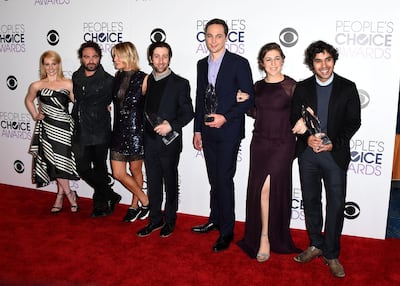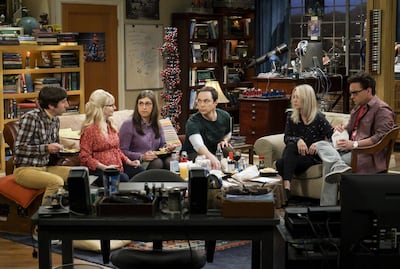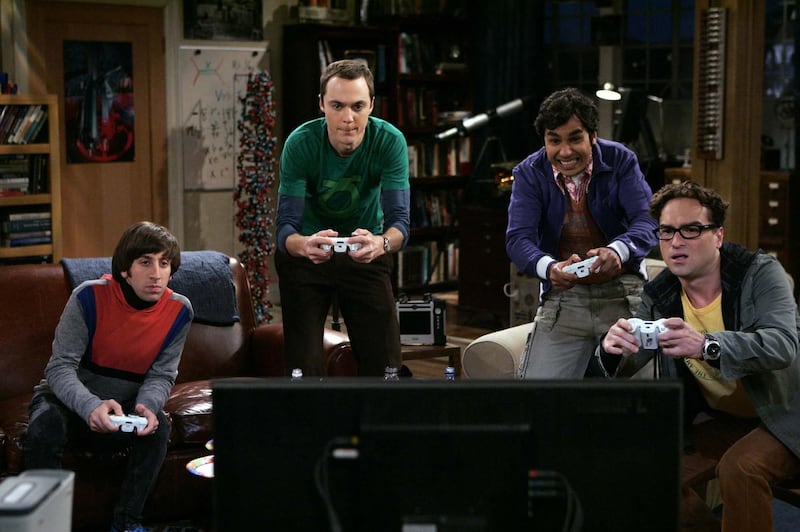Did you know that The Big Bang Theory was still a thing? I certainly didn't, and a quick straw poll of The National's arts and culture desk suggests that I wasn't alone.
It came as some surprise, then, to hear that the show will go out, presumably with a bang, following season 12 – yes, you read that right, season 12 – which will begin broadcasting in the US in September.
The sitcom, essentially a geek-friendly version of Friends, follows the lives of Leonard and Sheldon (Johnny Galecki and Jim Parsons), two nerdy theoretical physicists who share an apartment in Pasadena, California, and their equally geeky scientist friends Howard and Raj. Meanwhile, Penny, a waitress and aspiring actress lives across the hall with her fellow Cheesecake Factory waitress Bernadette (Kaley Cuoco and Melissa Rauch). In later seasons, Sheldon's girlfriend and eventual wife Amy (Mayim Bialik), a microbiologist, also becomes a central character.

All the classic Hollywood geek tropes can be found within The Big Bang Theory. The guys obsess over comics, are socially awkward and get excited by mathematical theories. They're all into role playing and Star Trek and, of course, there's a predictable "opposites attract" on-off romance that develops over the seasons between nerdy Leonard and the cute blonde waitress across the hall, who usually dates muscular jocks, of course.
Outdated and offensive 'beta-male' tropes
The nerd/jock dichotomy has been a fixture of the "nerd" genre right back to 1984's original nerd flick Revenge of the Nerds. It's perhaps surprising that in 2018 the genre still exists in exactly the same form. The Big Bang Theory really adds nothing new to the mix, indeed the episodes through all eleven series could be mixed up in a random order and you wouldn't be able to tell – the same stock situations and jokes are churned out as if by an online nerd gag generator.
What's more surprising in the era of #MeToo, however, is how The Big Bang Theory hasn't updated the genre considering what we know to be unilaterally unacceptable in 2018. It's surely the only show in popular culture today where a man can get away with sexually assaulting a woman, and it is considered comedic.
Somehow, the geeky, unthreatening nature of non-alpha males in the nerd genre makes it OK to molest sleeping, drunk girls (Revenge of the Nerds), spy on the object of your affection's bedroom with binoculars while hiding in a tree (Back to the Future) or, in The Big Bang Theory's case, use remote control cars fitted with webcams to film up your neighbour's skirt, as happened in 2017/18's season 11, or hack into military satellites to spy on the America's Next Top Model house.
Even when the male cast aren’t actively abusing the women in the show, female roles outside the central cast are rarely given more depth than “hot chicks,” a commodity the guys are constantly in search of. The hot chicks are invariably stupid, and the guys’ behaviour towards them is rarely anything but creepy, and often full-scale misogynistic. This is exemplified in a moment in which Sheldon tells a female colleague that women are “like an egg sandwich on a hot Texas day. Full of eggs and only appealing for a short while.”
The show is fully aware of its own sexism, and periodical racism, usually aimed at Indian nerd Raj, but it never criticises it or offers a solution. It merely acknowledges it and asks that we laugh at it.
The show almost didn't make it to season two
In fact, it’s even surprising that the show has survived long enough to be referenced in relation to the #MeToo movement. The first season, which began airing in September 2007, received a lukewarm reception at best from critics, and failed to break into the Nielsen rating’s top 50, ranking at number 68 with just over eight million viewers.
Somehow, it was still renewed for a second season, and the audience increased. The show began drawing over 10 million viewers per episode on average, and ranked number 40 at the end of its run. Its popularity just kept on growing, and by 2013/14’s season seven it was the second most popular show on US TV with over 16 million viewers. The sitcom held that position until 2017/18’s season 11, when it topped the charts outright.
In the UK, which is frequently a better barometer for quality comedy than the US, the show fared less well, though still respectably. It has regularly topped 2m viewers over its 11 seasons in Britain, though broadcaster Channel 4 clearly did not consider it funny enough to show on its main flagship channel, programming it instead on its more niche, digital offshoot E4.
At least the show is going out on a high in terms of US viewing figures. It would be nice to think that it is set to end thanks to its producers and writers realising it is living in the past, but that seems unlikely.

No official reason for the show’s cancellation has been given as yet, but reports out of Hollywood claim that negotiations were already underway between the show’s maker, Warner Bros TV, and broadcaster CBS for a further two seasons of nerd-themed anachronistic comedy. However, the show’s star, Jim Parsons reportedly announced to top brass that he was leaving after season 12, in the process turning his back on a million-dollar-an-episode fee, and bringing the curtain down on TV’s longest-running multi-camera show.
Will it be missed? Perhaps by the 18.5m US viewers that tuned in to watch season 11.
In my own personal universe, however, not in the slightest. The show’s demise will be the cultural equivalent of a single quantum particle being thrown out into an infinite universe. I certainly won’t be mourning the passing of this tragically unfunny show’s final episode.
In fact, it’s highly unlikely I’ll be watching it at all.
__________________
Read more:
'Crazy Rich Asians' hoopla elicits mixed feelings in Asia
Has Michael Caine ended the 'Inception' ending debate?
Blade at 20: how the film kick-started Marvel's cinematic success
__________________





